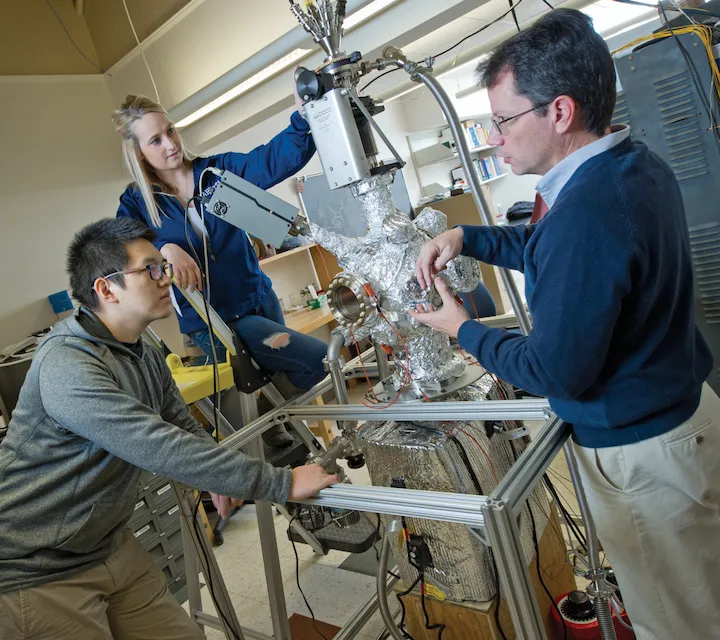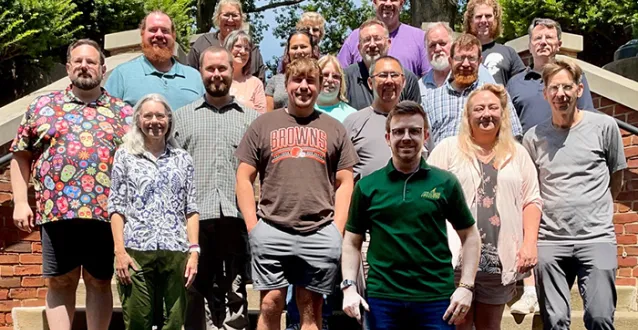Students who earn a degree in Physics from Marietta College position themselves to excel in graduate programs in areas such as physics, applied physics, astronomy, engineering, applied science, materials science, education, medicine, law or business, and are also ready for careers in an array of science-based industries.
In small classes and independent projects, you will work closely with faculty who are dedicated to teaching and mentoring student research. You will use state-of-the-art facilities including a parallel computing cluster and quantum optics, scanning tunneling microscopy and surface physics laboratories. Marietta Physics majors earn NASA summer research fellowships, internships at Stanford, Johns Hopkins and Columbia universities, work in our planetarium and present their work at regional and national conferences.
Majoring in Physics prepares students for graduate school in biophysics, materials science, renewable energy engineering, oceanography and many more.

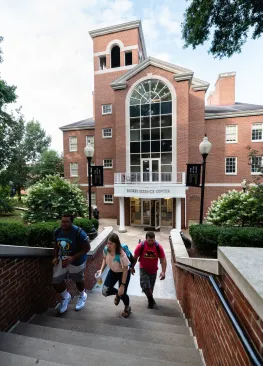
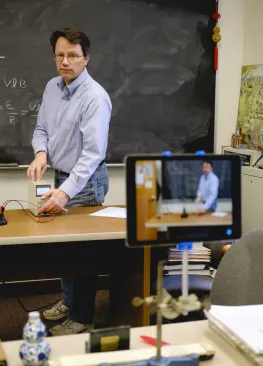
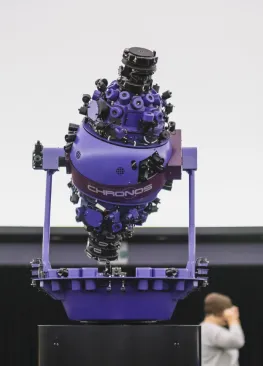
What You’ll Learn as a Physics Major
From the vastness of space to subatomic particles, the study of physics attracts the most curious minds intrigued with discovering how the universe works.
Well-rounded Education
Physics majors at Marietta College work closely with talented professors who are highly respected scientists in their field. Small class sizes and challenging coursework give students the attention, knowledge and confidence to become successful researchers, physicists and teachers. The liberal arts approach to studying physics benefits budding scientists by giving them a well-rounded education in the sciences and humanities. Our graduates are trained scientists who have the ability to communicate their work effectively.
Student Research
Physics majors are encouraged to pursue research alone, with fellow students or partnered with faculty. Over the course of their four years at Marietta, students will complete at least one research project — and many will land top national and international internships. Marietta’s students have conducted research at the National Superconducting Cyclotron Laboratory, the National Institute of Standards and Technology, the Argonne National Laboratory and the American Museum of Natural History.
More Info
Physics majors can also pursue a Secondary Education Physics Certificate, which will qualify them to teach this subject at the high school level.
- Outcomes — Professions
- Ceramic Development Engineer, GE Aviation
- Physicist, National High Magnetic Field Laboratory
- Physicist, Sandia National Laboratory
- Portfolio Analyst, AES Corporation
- Process Technology Development Engineer, Intel Corp.
- Research Engineer, Ford Motor Co.
- Researcher, 3M
- Senior Editor, Astronomy Magazine
- Technical Staff, Los Alamos National Laboratory
- Outcomes — Graduate Programs
- California Institute of Technology
- Columbia University
- Duke University
- Purdue University
- Rice University
- The Ohio State University
- University of California, Davis
- University of Cincinnati
- University of Wisconsin-Madison
- Wright State University
- Yale University
- Internships
- Science Undergraduate Laboratory Internship Program through the Department of Energy, SLAC National Accelerator Laboratory
- Stanford Linear Accelerator Laboratory
- American Museum of Natural History
- National High Magnetic Field Lab
- ENS Cachan-Paris
- Honor Societies and Student Organizations
Majors who excel in Physics are inducted to Sigma Pi Sigma, the national physics honorary.
The Marietta College chapter of the Society of Physics Students coordinates a variety of activities, including road trips to science-related sites, physics demonstrations on the campus mall and social activities. Physics majors may also present their research projects and internship experiences throughout the year during the Physics Colloquium Series, which also invites leaders in physics to speak on various topics of research and development.
FAQs
- What is the difference between Applied Physics and Physics?
Physics and Applied Physics have the same core of physics and math courses, including a mentored research project. They diverge in the upper-level coursework. The Physics major emphasizes intermediate and advanced physics courses. Most Physics majors go to graduate or professional school. The Applied Physics major is designed to be more flexible, combining the physics and math core with electives that enable the student to count courses from a non-physics field in the major. The intent is that the student can apply the math and physics core to another field. Typical outcomes for Applied Physics majors include the Engineering Dual-Degree Program, licensure as a high school physics teacher, or entry-level employment in a variety of technical fields immediately following graduation.
- Are there scholarships specifically for Physics majors?
Yes! We have a few scholarships, including the premiere Rickey Scholarship, which covers full tuition.
- Does the department accept AP credit toward the major?
Students who earn specific scores on their AP Exams will receive college credit toward a variety of classes.
